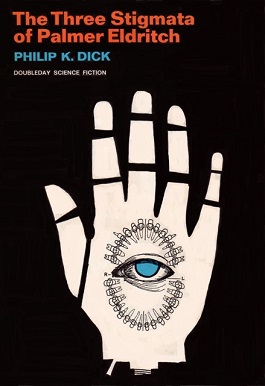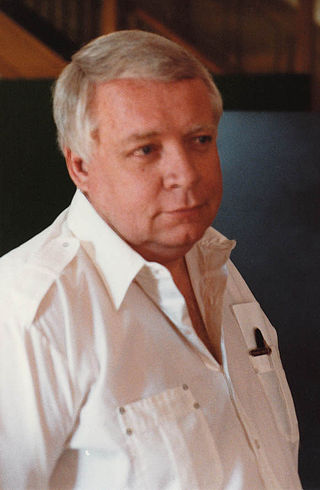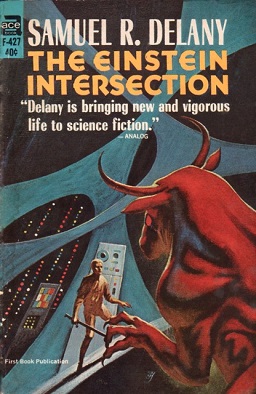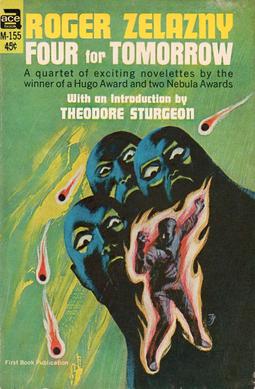Related Research Articles

The Three Stigmata of Palmer Eldritch is a 1964 science fiction novel by American writer Philip K. Dick. It was nominated for the Nebula Award for Best Novel in 1965. Like many of Dick's novels, it utilizes an array of science fiction concepts and explores the ambiguous slippage between reality and unreality. It is one of Dick's first works to explore religious themes.

Dangerous Visions is an anthology of science fiction short stories edited by American writer Harlan Ellison and illustrated by Leo and Diane Dillon. It was published in 1967 and contained 33 stories, none of which had been previously published.

Algirdas Jonas "Algis" Budrys was a Lithuanian-American science fiction author, editor and critic. He was also known under the pen names Frank Mason, Alger Rome in collaboration with Jerome Bixby, John A. Sentry, William Scarff and Paul Janvier. In the 1990s he was the publisher and editor of the science fiction magazine Tomorrow Speculative Fiction.

Robert Silverberg is a prolific American science fiction author and editor. He is a multiple winner of both Hugo and Nebula Awards, a member of the Science Fiction and Fantasy Hall of Fame, and a Grand Master of SF since 2004.

The Science Fiction Hall of Fame, Volume One, 1929–1964 is a 1970 anthology of English language science fiction short stories, edited by Robert Silverberg. Author Lester del Rey said that "it even lives up to its subtitle", referring to the volume's boast of containing "The Greatest Science-Fiction Stories of All Time".

Karen Joy Fowler is an American author of science fiction, fantasy, and literary fiction. Her work often centers on the nineteenth century, the lives of women, and social alienation.
"Gonna Roll the Bones" is a fantasy novelette by American writer Fritz Leiber, in which a character plays craps with Death. First published in Harlan Ellison's Dangerous Visions, it won both the Hugo Award and Nebula Award for Best Novelette.
"The Doll-House" is a short story by Hugh Jones Parry, under the name "James Cross". It was first published in Harlan Ellison's 1967 science fiction anthology Dangerous Visions.
"If All Men Were Brothers, Would You Let One Marry Your Sister?" is a science fiction short story by American writer Theodore Sturgeon. It first appeared in Harlan Ellison's anthology Dangerous Visions in 1967.

The Einstein Intersection is a 1967 science fiction novel by Samuel R. Delany. The title is a reference to Einstein's Theory of Relativity connecting to Kurt Gödel's Constructible universe, which is an analogy to science meeting philosophy. The original publisher, Ace Books, changed Delany's originally intended title from A Fabulous, Formless Darkness for commercial reasons.

Flowers for Algernon is a short story by American author Daniel Keyes, which he later expanded into a novel and adapted for film and other media. The short story, written in 1958 and first published in the April 1959 issue of The Magazine of Fantasy & Science Fiction, won the Hugo Award for Best Short Story in 1960. The novel was published in 1966 and was joint winner of that year's Nebula Award for Best Novel.

Tomorrow Speculative Fiction was a science fiction magazine edited by Algis Budrys, published in print and online in the United States from 1993 to 1999. It was launched by Pulphouse Publishing as part of its attempt to move away from book publishing to magazines, but cash flow problems led Budrys to buy the magazine after the first issue and publish it himself. There were 24 issues as a print magazine from 1992 to 1997, mostly on a bimonthly schedule. The magazine was losing money, and in 1997 Budrys moved to online publishing, rebranding the magazine as tomorrowsf. Readership grew while the magazine was free to read on the web, but plummeted when Budrys began charging for subscriptions. In 1998 Budrys stopped acquiring new fiction, only publishing reprints of his own stories, and in 1999 he shut the magazine down.

The Masks of Time is a science fiction novel by American author Robert Silverberg, first published in 1968. It was a nominee for the Nebula Award in 1968.

World's Best Science Fiction: 1966 is an anthology of science fiction short stories edited by Donald A. Wollheim and Terry Carr, the second volume in a series of seven. It was first published in paperback by Ace Books in 1966. It was reprinted by the same publisher in 1970 under the alternate title World's Best Science Fiction: Second Series. An Italian edition appeared in December 1966 under the title Il vento del sole.

Four for Tomorrow is the first story collection by Roger Zelazny, published in paperback by Ace Books in 1967. British hardcover and paperback editions followed in 1969, under the title A Rose for Ecclesiastes. The first American hardcover was issued in the Garland Library of Science Fiction in 1975. A French translation appeared in 1980. Paperback reissues continued from Ace and later from Baen Books into the 1990s.

Nebula Award Stories 3 is an anthology of award-winning science fiction short works edited by Roger Zelazny. It was first published in the United Kingdom in hardcover by Gollancz in November 1968. The first American edition was published by Doubleday in December of the same year. Paperback editions followed from Pocket Books in the U.S. in February 1970, and Panther in the U.K. in November 1970. The American editions bore the variant title Nebula Award Stories Three. The book was more recently reissued by Stealth Press in hardcover in June 2001. It has also been published in German.

Nebula Award Stories Two is an anthology of science fiction short stories edited by Brian W. Aldiss and Harry Harrison. It was first published in hardcover by Doubleday in September 1967, with a Science Fiction Book Club edition following in November 1969. The first British edition was published by Gollancz in 1967, under the variant title Nebula Award Stories 1967. Paperback editions followed from Pocket Books in the U.S. in September 1968, and Panther in the U.K. in 1970. The Panther edition bore the variant title Nebula Award Stories 2. The book was more recently reissued by Stealth Press in hardcover in September 2001. It has also been published in German.

Nebula Awards 21 is an anthology of award-winning science fiction short works edited by George Zebrowski, the second of three successive volumes under his editorship. It was first published in trade paperback by Harcourt Brace Jovanovich in December 1986, with a hardcover edition following from the same publisher in January 1987.

Nebula Awards 20 is an anthology of award winning science fiction short works edited by George Zebrowski. It was first published in hardcover and trade paperback by Harcourt Brace Jovanovich in November 1985.

Nebula Award Stories Seventeen is an anthology of award winning science fiction short works edited by Joe Haldeman. It was first published in hardcover by Holt, Rinehart and Winston in August 1983; a paperback edition was issued by Ace Books in June 1985 under the variant title Nebula Award Stories 17.
References
- 1 2 3 "Light of Other Days". isfdb.org. Internet Speculative Fiction Database. Retrieved 2013-10-10.
- ↑ "Bob Shaw". Fantastic Fiction. Retrieved 2013-10-10.
- ↑ Budrys, Algis (October 1968). "Galaxy Bookshelf". Galaxy Science Fiction. pp. 164–171.